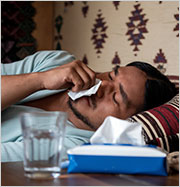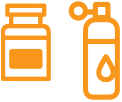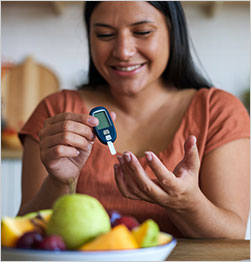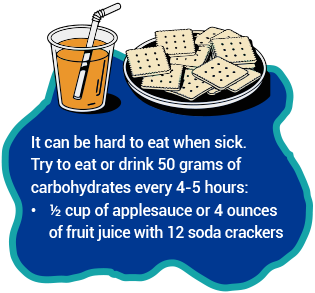Be Prepared for Sick Days
BE PREPARED for Sick Days

Stay on a straight path.
Be in a good way.
People with diabetes can get sick even when doing their best to maintain balance. On sick days, managing blood sugar can be difficult. Work with your health care team to make a plan to be prepared when sick.
Share
View Handout [PDF – 838 KB]
Prepare Before Getting Sick
PROTECT YOURSELF
Vaccines help protect against many preventable illnesses such as the flu, pneumonia, respiratory syncytial virus (RSV), and coronavirus. Be sure to get your annual vaccinations to help prevent getting sick or shorten its duration.
HAVE ON HAND
Medicines and Supplies:
- Diabetes medication(s)
- Glucose testing supplies
- Thermometer
- Glucose tablets or gels
- Fever/Pain relievers
- Medicine to control diarrhea
- Antacid
Food and Fluids:
Easy to prepare and contains carbohydrate:
- Sports drinks or juice
- Gelatin or applesauce
- Cereal or crackers
- Chicken soup
- Popsicles

DISCUSS WITH YOUR HEALTHCARE TEAM
- When to call your doctor or go to an emergency room
- How frequently to check your blood sugar
- How to adjust your insulin or oral medication, if necessary
- Which over-the-counter medications are recommended for colds or the flu
Practice preventive measures daily, such as avoiding people who are sick, covering your mouth when you cough, wearing a mask, and washing your hands often.
On Days You Are Sick
TAKE YOUR MEDICINE
- Continue taking your diabetes medications as usual or adjust according to your sick day plan.
MONITOR
- Test your blood sugar regularly and manage highs and lows as illness can cause fluctuations. Checking Your Blood Sugar
- Check your temperature every morning and evening. Call your provider if your temperature is 101° or more for 24 hours.
STAY HYDRATED
- Drink clear liquids like water, tea, broth, and calorie-free fluids to prevent dehydration.
- Try to drink 4 to 6 ounces every half-hour.

Seek Medical Care
CONTACT YOUR PROVIDER IF YOU ARE:
- Unable to keep fluids down for more than 4 hours.
- Unable to eat or keep foods down for 24 hours.
- Unable to keep down medications.
- Vomiting or diarrhea for more than 6 hours.
- Feeling unusually sleepy or can’t think clearly.
CALL 911 OR GO TO THE EMERGENCY ROOM IF YOU HAVE:
- Difficulty breathing
- Chest discomfort
- Abdominal pain
- High fever over 101º F for 24 hours
- Blood sugars consistently LESS than 60 mg/dL or MORE than 240 mg/dL, and unable to correct

Talk with your health care team about making a sick day plan. Write down your plan, including your provider’s name and phone number, and share your plan with a family member or a caregiver.


